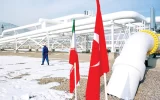Why is the Iran-Türkiye gas agreement a win-win game?

According to the exclusive report of Energy Press, Iran and Turkey, two non-Arab countries in the Middle East, are among the largest and most populous countries in the region. Iran has a strategic position in the Persian Gulf and the Strait of Hormuz, and Turkey controls the strategic straits – the Bosphorus, the Sea of Marmara, the Dardanelles – that connect the Black and Aegean seas. The two countries are from the oldest civilizations in the world and have a strong national identity.
Iran has huge reserves of oil and natural gas and is one of the founding members of the Organization of Petroleum Exporting Countries (OPEC) and the Gas Exporting Countries Forum (GECF). Iran was the first country in the Middle East where oil was discovered in 1908, and since then it has been recognized as one of the major oil exporters. The Islamic Republic consumes much of its own gas, however, ambitious plans are underway to significantly increase production and exports. In contrast, Turkey has limited oil and gas reserves and is heavily dependent on foreign sources to meet its growing energy needs. However, due to its strategic location between major producing regions (Persian Gulf, Caspian Sea and Russia) and a key consumer market (European Union), Turkey is widely considered as a major oil and gas hub.
The win-win result of gas contract extension
On April 4, Turkish Energy and Natural Resources Minister Alparslan Bayraktar traveled to Tehran to meet with his Iranian counterpart, Javad Oji, to discuss new opportunities for energy cooperation within the framework of the existing cooperation memorandum between Ankara and Tehran. Also, Javad Oji announced Iran’s readiness to expand relations with Turkey in the upstream and downstream sectors of the oil industry. In 2001, Iran signed a 25-year gas export agreement with its northwestern neighbor, Turkey, which expires in 2026.
Until recently, Turkey has imported a total of 156 billion cubic meters of natural gas from Iran over the past 28 years in the framework of cooperation between the two countries. In this regard, Ankara is seeking to secure new gas contracts with its southeastern neighbor. Iran is still the second largest supplier of natural gas to Ankara, and this country, which has oil and gas resources, supplied 16% of Turkey’s natural gas needs in 2023. According to official data, Turkey imported about 3.3 billion dollars of natural gas from Iran last year.
The two countries exchanged $493 million in non-oil goods in January 2023. Meanwhile, Turkey exported 324 million dollars of goods to Iran in January 2024, which was a 35% increase compared to the same period last year. Bayraktar’s visit to Tehran was in line with Javad Oji’s previous visit to Ankara in January 2024 to discuss the expansion of energy partnership, as Iran’s energy sector is in dire need of foreign financial resources due to the severe economic sanctions imposed on Tehran.
In addition, the Iranian government is seeking closer relations with Turkey and its regional rival due to several important issues, including energy and regional security. Hence, in January 2024, President Ebrahim Raisi made an official visit to Ankara to increase its partnership with the neighboring country and seek new interests.
The officials of the two countries, including Uji and Bayraktar, emphasized their commitment to strengthen bilateral ties and their common interests. They discussed a wide range of bilateral issues, including security, energy and trade, emphasizing the mutual benefits of their energy partnership. Minister Bayraktar’s visit to Tehran paved the way for deeper energy cooperation between Ankara and Tehran.
- Comments sent by you will be published after approval by site administrators.
- Comments that contain slander will not be published.
- Comments that are not in Persian or not related to the news will not be published.

Comments
Total comments : 0 Awaiting review : 0 Date: 0